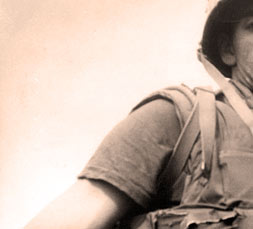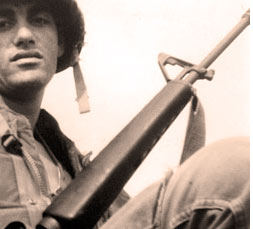|
 |
 |
 |
|||
|
Romancing the Milestone
Village Voice, August 9, 2005
Imperative viewing: Winter Soldier If Milestone isn't quite the runaway winner of stateside art-film/retro theatrical and video distribution (Kino, First Run, Wellspring, and Facets vie for the top shelf on a quarterly basis), it's not for lack of kudos-a New York Film Critics Circle citation and National Society of Film Critics nod, and now a week at the Walter Reade showcasing its most recent acquisitions. It couldn't have happened to a nicer or smaller family-run outfit; over the years, Dennis Doros and Amy Heller have put their faith in Mikhail Kalatozov, Lotte Reiniger, Hirokazu Kore-eda, Marion Davies, and Manoel de Oliviera when no one else would. As it is, their most prescient release might be Winter Soldier, a rarely glimpsed document, shot and assembled by an anonymous filmmaking collective, of the 1971 "Winter Soldier Investigation." A month after the news of My Lai shook Americans rigid, over 100 returned vets testified in a Detroit Howard Johnson conference room that My Lai was no aberration, but a paradigm of U.S. activity in Vietnam. The resulting first-person-witness assault demonstrates, in the fashion of Shoah, that being told can be more lacerating than being shown; we experience not only the atrocities but the shock waves felt by the witnesses and the emotional venom that still necrotized their lives. Not that the sympathies lie only with the terrifyingly calm and earnest speakers; every story is a story about farmers butchered as a kind of sickened imperial bloodsport, and the bootprint the movie leaves might be the deepest of any 'Nam doc. It's difficult to stomach "Proud Vietnam Vet" bumper stickers after Winter Soldier, or even endure American cinema's self-pitying bankload of fiction movies about the war. (No less unchewable is the subsequent career of John Kerry, a peripheral presence in the movie, in light of his role in the hearings.) Of course, no news outlet would cover the event, and no distributor or broadcaster would touch the film record. Whoever saw it in 1972 saw it at the Whitney; after that, only WNET threw it on once unannounced as a replacement program. Otherwise, the 15 filmmakers-including Barbara Kopple and David Grubin-have had to host private screenings themselves. So, what was intended to be a public turning point in our knowledge of the war's true nature was effectively run underground-which makes the film imperative viewing in 2005 (if not, unfortunately, in 2002). The afterlife of the Vietnam home front experience indicates that we saw it all in our living rooms, or in Hearts and Minds-but, no, we didn't. A Winter Soldier screening should be a voter registration requirement. Milestone's marathon date with film history continues in Electric Edwardians, a collection of actualités shot between 1900 and 1913 by traveling cine-ethnographers Sagar Mitchell and James Kenyon. The pair of pioneers simply toured England and photographed public life-parades, fairs, school processions, factory workers going home-uniquely capturing the Edwardian quotidian in amber. Twenty-eight hours of their negatives have been recently discovered and cataloged by the National Fairground Archive, but this selection is as succinct, sweet, and rueful as an elderly dream. It's invaluable as archaeology-no other visual record of the era in Great Britain is nearly as rich and as viewing it's primeval cinema, a fragile window on an extinct universe. E.A. Dupont's Piccadilly (1929), the celebrated nightclub melodrama starring the electric vamping of Anna May Wong, comes out for an encore, but Marcel Ophuls The Troubles We've Seen (1994) will be a fresher draft for most of us. At nearly four hours, it is the mega-doc master's most relaxed and ruminative film, shot on video and so hilariously un-shy about placing Ophuls cosmopolitan presence at center frame that the movie begins to seem somewhat McElwee-ish. Except that here, the film is actively hunting for answers, not artfully constructed around them. Subtitled "A History of Journalism in Wartime," Troubles dabbles in old war stories, film clips (Howard Hawks is favored), interviews with Martha Gellhorn biting the head off Hemingway's ghost, and so on, but mostly it's a record of two trips to Sarajevo and the surrounding areas that Ophuls made in 1992, interviewing the French and British reporters he meets about their professional ethics and practicalities. It's a massive, veiny slab of a movie, filthy with insight and experience. The topic of war journalists might not seem quite significant enough to support Ophuls approach (the war, the politics, and the locals' ordeal naturally overshadow the press), but the irony of their privileged, voyeuristic position is perpetually picked over. At the very least, it's a startling presentation of the kind of international news we don't get in this country, where the question hasn't been how much to cover the suffering of Bosnians, but whether to bother at all. Indie Distributors Celebrate 15th Birthday With a New Milestone
Village Voice, August 9, 2005 Milestone Film and Video co-founders Dennis Doros and Amy Heller can thank the fragility of the Kerry campaign and the ferocity of the extreme right for helping launch their new politically minded company Milliarium Zero and its first release, Winter Soldier. After John Kerry won the Democratic nomination, Film Forum's Karen Cooper considered showing the devastating 34-year-old documentary. But after worrying that it might do more harm than good for Kerry, Cooper lost interest, allowing Doros and Heller to pick it up. "We're really glad it didn't show last year, because it's not about John Kerry-it's about the horrors of war," says Doros. The New Jersey-based couple had always planned on distributing the film through their widely respected Milestone label. But, says Heller, "because the right is well funded and very litigious, it became clear that the best way to release it was to have a separate corporation that would protect the assets of Milestone just in case the Swift Boat Veterans want to make trouble." Now under their new banner Milliarium Zero, Heller and Doros say they can take on riskier material. They're currently looking to acquire Seasoned Veteran, a portrait of Winter Soldier and acquitted Gainesville Eight member Scott Camil. The duo believe their new venture is just an extension of the type of cinema they've been delivering for the last 15 years. Doros likens Winter Soldier to two Marcel Oph titles, The Sorrow and the Pity and The Troubles We've Seen: "They're about the truth and what people do in times of great horror." For the filmmakers and veterans who took part in Winter Soldier (many of whom will be present for an after-screening discussion on August 12), the movie remains eerily relevant. "It was a very powerful film to do at a very vulnerable age," says docu-luminary Barbara Kopple. "It was hard to see guys of our age going through the most horrible experience of war. They were throwing people out of helicopters. Today, it's Abu Ghraib." |
MORE REVIEWS
'Winter Soldier': Cold Days in Hell
Taking responsibility for what happens in war is the subject of a searing documentary.
War Vets Share Experiences of Combat |
||||
|
|||||